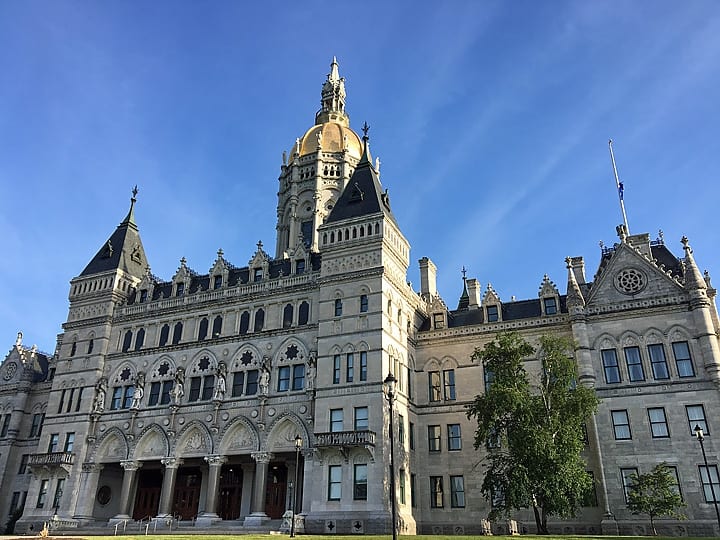Police to Rally Against Reform as Lawmakers Convene

Audio By Carbonatix

State Capitol. Courtesy of CTNewsJunkie.com (we-ha.com file photo)
The elimination of qualified immunity is of great concern to police organization who feel that it would cause officers to avoid talking necessary actions in an emergency.
By Lisa Backus, CTNewsJunkie.com
Calling the proposed police accountability bill a “direct assault” on good law enforcement, police from around the state plan to rally at the Capitol Thursday morning as lawmakers convene for a special legislative session.
The bill, which requires independent investigations of deadly use-of-force incidents, periodic drug and psychological testing for officers and more civilian review boards, was hotly debated during a marathon listening session last week.
The proposed legislation also takes aim at “qualified immunity,” which allows police and other municipal employees to avoid financial repercussions if they are sued in state court for actions taken while on duty.
Large police organizations throughout the state have universally panned most sections of the 65-page bill, especially the elimination of qualified immunity. They said being financially liable would cause officers to hesitate to take dramatic action in an emergency.
“It’s a very bad bill,” said Danbury Sgt. John Krupinsky, president of the 1500-member Connecticut State Fraternal Order of Police. “We’re not against change, we’re not against reforms that make it better for our guys and citizens. This bill clearly doesn’t do that.”
The issue has become so intense that Gov. Ned Lamont suggested repeatedly this week that the qualified immunity section of the legislation be removed so that the reforms in the rest of the bill can move forward.
“I’ve heard a lot of pushback on that, on both sides of the aisle in the legislature,” Lamont said Tuesday. “And anything that jeopardizes that bill I think, let’s put that on pause. Let’s have a task force or something to look into it. Let’s pass what we can, now. I think the bill is very strong without the qualified immunity.”
Setting aside the qualified immunity provision, the bill does hold police accountable by making sure officers who are problems will “be off the beat and out of work and no longer able to work in the police force throughout the state,” Lamont said.
Advocates call the proposed legislation an opportunity to redefine policing in the state by adding more protections for the public, including easier ways to terminate officers who have engaged in wrongdoing.
“It’s unsurprising that policing’s political machine is opposing even this modest police accountability bill, as policing lobbyists have consistently attempted to stop even the smallest attempts to prevent racism and violence in policing,” said Melvin Medina, public policy and advocacy director of the American Civil Liberties Union of Connecticut.
“Every elected official in Connecticut, from the municipal level to the governor’s mansion, has a responsibility to act to end police violence and racism,” Medina said. “Policymakers must value Black and Latinx people’s lives over the fear-mongering of the policing lobby, and that requires going beyond lip service to enact meaningful change.”
The bill was largely drafted by state Sen. Gary Winfield, D-New Haven, co-chair of the Judiciary Committee, and the other leaders of the committee after the death of George Floyd in police custody in Minneapolis sparked weeks of protests throughout the nation and in Connecticut.
Winfield is gearing up for a fight as the special session will only address police accountability, insulin cost reductions, expansion of telehealth and absentee ballots.
While the Connecticut Conference of Municipalities supports the bill overall, officials expressed concern Wednesday that local taxpayers would pay the tab if a municipal officer had no qualified immunity in state courts.
“Connecticut and the nation demand meaningful police accountability reform, and CCM supports reform,” said Joe DeLong, the organization’s executive director and CEO. “If legislation eliminates local government immunity, however, the actions of rogue police officers may only further punish property taxpayers across Connecticut; force tax hikes in poor, urban communities and bring about cuts in services where they are needed most.”
The Police Officers Association of Connecticut also panned the bill, saying in a press release Wednesday that “it is a direct assault on good officers that handcuffs us from doing our jobs.”
The POACT wants legislators “not to rush this bill” and they want a seat at the table during any discussions on the legislation moving forward.
“It puts our lives at risk, and the lives of the people we protect at risk,” the organization said. “Recruitment and retention in law enforcement is a nationwide problem and this bill will only discourage qualified applicants who wish to serve their communities.”
Krupinsky, who expects “thousands” of officers to show up at the rally Thursday, wants the bill taken up during the next regular session slated for January, with police involved in drafting the legislation. “They are trying to do a complicated bill in 14 days,” he said. “We could do it next session, even if it takes us three or four months to get a good bill.”
Republished with permission from CTNewsJunkie.com, all rights reserved.
Like what you see here? Click here to subscribe to We-Ha’s newsletter so you’ll always be in the know about what’s happening in West Hartford! Click the blue button below to become a supporter of We-Ha.com and our efforts to continue producing quality journalism.



